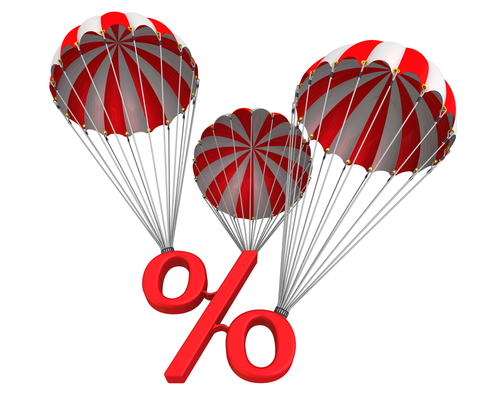
- RBC Cuts Again: The nation’s biggest mortgage lender dropped six “Special Rates” today:
- 1yr: 3.14% to 3.04%
- 2yr: 2.79% to 2.69%
- 3yr: 2.99% to 2.89%
- 4yr: 3.04% to 2.94%
- 5yr: 3.24% to 3.09%
- Variable: Prime + 0.25% to Prime +0.00%
- Quick take: Despite the fact that prime + 0% is nothing to write home about, any improvement in variable-rate pricing is positive. It’s a sign that funding markets are performing more as they should following last month’s COVID-related liquidity issues. Expect floating-rate discounts to continue improving, albeit slowly. RBC’s 1-year posted fixed rate also dropped today, from 3.29% to 3.19%. The main reason that matters is that it could boost prepayment charges for RBC borrowers trying to break their fixed mortgage in the last year of their term.
- CIBC Cuts Too: CIBC chopped the following posted fixed rates:
- 1yr: 3.29% to 3.19%
- 2yr: 3.04% to 2.89%
- 3yr: 3.94% to 3.79%
- 4yr: 4.49% to 4.34%
- 5yr: 5.19% to 5.04%
- 7yr: 6.25% to 6.10%
- 10yr: 6.44% to 6.29%
- Notable: Note how CIBC chose to lower its 5-year posted to 5.04% instead of 4.99%. Had they dropped to the latter, it could have lowered the federal stress test rate by 5 bps. The minimum stress test rate has been over-inflated and stuck above 5% for over two years. As for the bank’s 1- to 3-year posted rate cuts, those serve to boost prepayment penalties for CIBC customers who want to break a fixed mortgage early and have one to three years remaining on it.
- Crude Impact: The demise of oil will weigh heavily on mortgage rates in the short term and incrementally over the long term. That’s our topic in this month’s Globe column

- Sales plunge: Seasonally adjusted April home sales in the GTA could potentially fall “to their lowest since March 1990,” says Capital Economics’ Stephen Brown. “…We have pencilled in a 5% drop in nationwide house prices in the next few months.” Some of the most at risk are folks who bought a new home without selling their existing home first.
- Deal Breakers: Most property purchases are still closing, but “with 44% of Canadian households reporting some form of work disruption, there will inevitably be a number of potential [real estate] buyers forced to abandon their plans mid-deal.” MBN Story
- Fresh Job Letters: With all the job losses, many lenders are requiring applicants to provide job letters that are no more than 10-14 days old. Pre-COVID, 30-, 45- or even 60-day-old job letters were allowed, depending on the lender.
- Business Discontinuity: 79% of small businesses are either partially or fully closed because of COVID-19, reports the CFIB. 44% are not sure if they’ll make it past May if lockdown lasts that long. “Our assumption is that the economy starts to open up again sometime in June,” predicts RBC. Some analysts expect as many as 1 in 5 small businesses to go extinct post-COVID, a number that implies further disinflation and negativity for interest rates.

- Domino Effect: Lost rents mean higher default risk on income property mortgages. Credit lines are keeping some investors afloat. About 15% of Canadian homeowners are landlords. Globe Story
- Imagine if It Happened Here: America’s biggest bank, JP Morgan, has halted issuing new home equity lines of credit (HELOCs) as default risk grows. It won’t be the last. American Banker Story
- Realtor Ruffles Feathers: Many didn’t take kindly to this real estate agent’s recent warning: “…Get your home on the market fast to sell first and get the top price before the market becomes difficult.” LFP Story
- Some Builders Now Subsidizing Mortgages: But will they just build it into the price of their new homes? It’s also worth noting that builder incentives reduce the effective purchase price (fair value) in the lender’s eyes. Because the developer does not reduce the actual purchase price, builder incentives can potentially require a bigger down payment from the borrower. Edmonton Journal Story
- Insured Refis (Opinion): It’s time to bring them back, believe many in the industry. Mortgage refinancing is the only way that tens of thousands of borrowers will dig themselves out of their COVID debt holes. But even when refinance applicants meet standard lender guidelines, risk-averse lenders are increasingly declining them. Government-backed default insurance would ensure qualified borrowers keep getting approved. Ottawa has given away the farm in seemingly every other way. This is one other actuarially sound measure that would make a whole lot of difference in Canadians’ lives.
- Quotable: “One of the great legacies of the current crisis is that after the pandemic has passed, we’re going to have more indebted households”—Craig Alexander
- Excessive Wager: This guy tried to refinance in order to pay off a $500,000 rock, paper, scissors bet. Now that’s a new one. Post Story

 log in
log in
6 Comments
I don’t see what the big deal is with that realtor telling people prices could drop and selling early may get you more money. People are too damn sensitive.
“JP Morgan, has halted home equity lines of credit as default risk grows. It won’t be the last.”
Hmm might be a good idea to stow away some cash AT ANOTHER INSTITUTION at near zero rates Canadians before they take your unused HELOC balance away. Its a low cost move. A month early better than a day late.
JPM stopped originating new HELOCs. Haven’t heard anything about them freezing HELOC limits for borrowers who are paying as agreed (yet). But they can in some cases: http://www.givemebackmycredit.com/blog/2009/06/jpmorgan-chase-and-wamu-face-m.html
If a bank believes you’ve lost your job, your credit has significantly deteriorated or your property value has dove, it has every right to alter the terms of your HELOC, or in some cases call in the HELOC.
A while back I heard from two separate HELOC customers who envisioned this. One lost his job and the other was in Alberta and saw his home value dive. In both cases they took out a whack of cash “just in case” ($50,000 and $100,000 if I recall) and plunked it into a high-interest savings account. People will do what they have to do to stay liquid. Just know that banks have enormous latitude in their HELOC contracts and whatever you do, don’t ever miss a HELOC payment.
On insured refinance: wouldn’t many affected borrowers have heloc room given all the re advanceable helocs automatically added with collateral charges. Or are you thinking high ratio refinancing
David
I think they’re referring to people who need a new mortgage, not people with an existing HELOC.
That’s right $teve